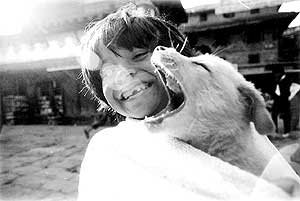 Visit by the Kosi at Sitale. It is d?j? vu. Depressive thoughts and negative thinking, but I sit by as the rushing waters, watching the cranes fly by, the massive Gauri Shankar, hidden from view, but like a best-remembered treasure available behind the next bend.
Visit by the Kosi at Sitale. It is d?j? vu. Depressive thoughts and negative thinking, but I sit by as the rushing waters, watching the cranes fly by, the massive Gauri Shankar, hidden from view, but like a best-remembered treasure available behind the next bend. Urmila, that pixyish 13-year-old (or so she says), wise beyond her years, young lady of the village, that gossipmonger, tells me tales of larger than life fish, that she and her hunchbacked grandmother caught at this very same place.
Is it fantasy, exaggeration or reality? Did she really catch that fish and cook it in the servant's kitchen or was it an imagined taste and a smell of memory? Delights that she had seen and hoped for, but never really tasted, and maybe never would?
It has been a culture shock, a play unfolding itself before my eyes. That gamine, Urmila, born in my friends' family, child of a retainer, and the "bhuri" whom everyone calls for-right from the hajurama to the kanchi mummy.
Springing up on spindly legs, below an oversized maxi. Fulfilling everything from bringing hot embers for the grand old lady's hookah, sistering the youngest pampered child that bites and kicks her. Is this life? What does she aspire for? To become a "Miss". The village school teacher who wears a neat sari, tucked and tied with a colourful pin, Chinese sandals and red lipstick.
Oh yes she has aspirations. "If they want they will make me study, but if they do not wish, what can I say?" The only sympathy that she gets is from the thulo kaji, who once in a while gives her a rupee to buy some sweets, but she is too much in awe of him to go closer. She dare not tell him: "I want to study". But she day dreams about going to school, fanstasises about being in Grade I.
Urmila, with her intelligent eyes, observant and alert, the silent witness. The invisible character, a part of the wall, a part of the floor, and just beyond reach. No one believes she has a voice, a person with feelings, as one who can see and watch the myriad webs that are woven on the family loom.
She is the historian and rumour-monger-knows all the skeletons in the family cupboard. She talks of the black sheep of the family, now in jail, having killed his father-in -law in a frenzy, who howls like the wolf on moonlit nights. She talks of the deaths and the births, the maisahebs, who preen themselves, perming and coloring their graying tresses with henna, too stingy to give her a decent dress.
The other daughter-in-law, who praises her if she washes her clothes, but will not spare the rod, the children spoilt and foul mouthed brats. She walks the forests alone, collecting firewood and grazing the goats, Fearless, indomitable bundle of energy, not afraid of the ghosts, but only of the dark hag who lives by the water, who she gleefully reminds me comes out occasionally to sun itself on the very rock that I am sitting on.
h, she has tall tales of mean-faced monkeys that try to bite her and the tiger cub that she found and left for others to pick up. She says, "If you can raise a tiger cub, you can get lots of money." But with a sashay and a flick of her hand, she says if she finds another one, she'll drown it. "If the mau follows the cub, then it will eat up all the goats and chicken."
A non-stop talker, she looks at me with her head cocked to one side, like a mischievous magpie, and likens me to the mad "chunni" , who used to sit by the river until finally one day she drowned herself. She cannot imagine what is it that I find in this village of hers, that should bring me from that magical Kathmandu.
She loves the drunken revelry at the marriages, but as for the institution of marriage, she has her own views. "It's just exchanging looking after one's cows and fields for someone else's cows and fields, today it is hajurama tomorrow it will be some other man's. What is the difference?"
Here I am, a 45-year-old city slicker getting a lesson in life on the banks of the Kosi. Here I am, supposedly an emancipated, progressive woman, learning from a 13-year-old about gender roles, learning the shocking truth about my own inadequacy. There goes my bubble of bliss.


